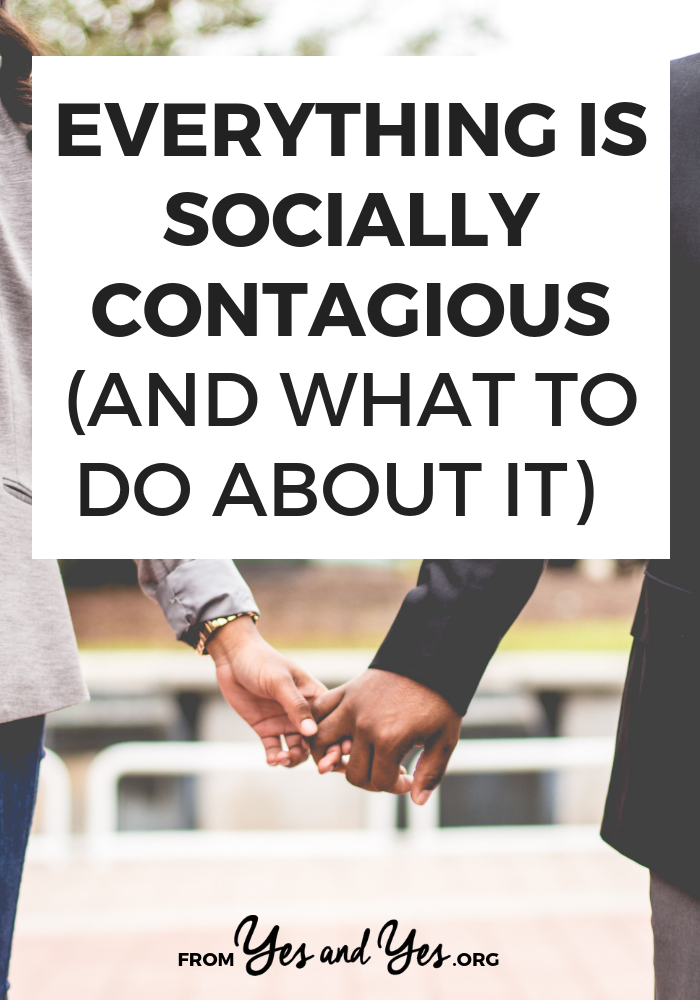
It’s Saturday night and I’m cuddled into the corner of my friend’s couch. The wine is flowing, the fireplace is roaring, and we’re all picking at the post-dinner party cheese tray.
We’ve progressed to the part of the night where enough time has passed (and enough wine has been consumed), that we’ve given ourselves over to gossip.
We’ve talked about That Couple’s divorce and That Friend’s propensity towards oversharing on Facebook.
Gossiping and passing judgement are my greatest vices and the character traits I like least in myself. But the gossip is contagious and before I know it, I’m saying things I shouldn’t and sharing stories that are absolutely not mine to share.
Groooooss.
Of course, I take 99% of the responsibility for this behavior but the truth is, that quote we see on Pinterest is REAL. We are, in fact, the average of the five people we spend the most time with. Pretty much everything humans do is socially contagious.
We’re pack animals! We evolved to live in groups, to cooperate and collaborate with others so we could, like, get the best cave, the best Mastodon drumstick, and not get exiled to the dark, cold tundra.
So it makes sense that everything, ever is socially contagious. We’re ‘safer’ when we’re behaving like the people around us. But what happens when our friends, family, neighbors, or coworkers make choices that aren’t right for us?
What happens when we ‘catch’ habits and behaviors that actually push us further from the people we want to be?
Habits that are socially contagious
Spending habits are contagious
Imagine that you struggle to pay off your credit card every month. You squeak by, but it’s close.
Now picture a dinner party. Your friend jokes about her shopping habits and the enormous balance she carries. Everyone at the table laughs because #relatable.
Wouldn’t that make you think, “Why am I working so hard to pay off my card every month? Everybody else is carrying a balance and they seem fine! WHO CARES I GIVE UP I’M GOING TO CARRY A BALANCE NOW TOO.”
Now imagine that you’re catching up with another friend over coffee. You’re biting into your peanut butter cookie when she says that her upcoming vacation is all airline points and Groupons. She’s soooo close to having a 20% down payment for a condo. And she did it all by going on a Spending Diet.
An inspiration! An epiphany! If girlfriend can do it, maybe you can, too!
Related: How to stop buying shit you don’t need
Mindset is contagious
“I’m not sure if I’ll get the job, but I did my absolute best at the interview and I’m proud of myself for even getting that far.”
“Just going to say it: My ass looks amazing in these jeans.”
“That grudge is over. I’m sick of spending my time thinking mean thoughts about him; I’m moving the eff on.”
What if these were the sorts of things that your friends said over coffee or that your co-workers said in the breakroom? How would they affect the way you thought about your own job search, your butt, the way you feel about That One Guy?
Now imagine hearing things like this:
“Gawd, I don’t know why anyone would hire me.”
“Ugh. I look disgusting in this outfit.”
“I hate him and I fully anticipate hating him on my deathbed.”
It’s a lot easier to have those same thoughts when we hear that ish all the time. When we see people in our lives thinking things we already have an inclination towards, it’s permission to think that way too.
Even health choices are contagious
We know that fried food wrecks havoc on our GI tract but if our friends are ordering the Giant Platter Of Fried Things – well, it’d be rude not to take part. I wasn’t planning on stopping by the bakery this morning (sugar crashes ruin me for hours), but since my coworkers are, I’ll grab a few donuts real quick.
When all our friends start running 5ks, we’re a lot more likely to download that ‘Couch To 5k’ app and actually, ya know, use it. When our coworkers stop smoking and we realize we’re the only one standing in the cold with a cigarette, we’re more likely to quit.
Life choices – LIKE ALL OF THEM – are contagious
In the last two years, lots of people I know have started to hire house cleaners. We’ll be at a barbecue, standing around the picnic table, and someone mentions that their life is now divided into B.C. and A.C. – Before Cleaners and After Cleaners. And each party, more people have jumped on the house cleaner bandwagon.
Just about any life choice – buying a house, getting a dog, having kids, splitting up, going vegetarian – can spread. I imagine you’ve witnessed this in your own social circle or extended family. You can watch the behavior slowly spread; each time you see your people, more of them have made the leap.
What to do about it
Social contagion is not, of course, a reason to bail on wonderful, supportive friendships with people who shop a lot or smoke the occasional cigarette. None of us are perfect and the world would be boring if we were.
I’m also not encouraging you to vet someone’s credit score, internal dialogue, or bad habits before you start hanging out with them. We benefit from spending time with lots of different people, who make different life choices and have different thought patterns!
But let’s make sure we know what we’re doing, notice how these relationships affect us, and plan accordingly.
Realize what’s happening
True story: I didn’t realize a specific friend’s negativity was affecting me till I found myself on my third bowl of noodles and butter after a morning with her. (Noodles and butter are my stress ‘tell’.)
When you find yourself thinking or doing not-particularly-awesome things, work backwards and ask yourself “Why am I doing this, really?”
Did you just buy a bunch of stuff you don’t need because you saw your shopaholic friend who regaled you with tales of his latest shopping spree? Are you thinking unkind thoughts about your abs because you went for a hike with your fitness-obsessed buddy who’s upset that her six-pack is now a four-pack?
When we understand what we’re ‘catching,’ we can change our interactions accordingly. Share on X
Redirect the conversation
Now that you’ve realized your fitness-obsessed friend inspires less-kind thoughts about your own body, redirect the conversation when she starts trash-talking hers.
“I think you look great! Say, whatever happened with that big pitch you did at work?”
“You know I always think you look amazing. What are you and Chris doing for Thanksgiving? I’ve been meaning to ask you for that recipe you always make!”
The less time she spends talking about her abs, the less likely you are to obsess over yours.
Hang with intention
Not all social influence is created equal. Some of us are affected by group settings, sometimes it’s one-on-one, IRL interactions. Maybe everything’s fine till alcohol is involved.
Notice when you’re ‘catching’ behaviors you don’t want and plan accordingly. Don’t meet your shopaholic friend at the mall. If a friend’s constant negativity gets you down, see them in group settings so you won’t be the only recipient of their complaints.
If you love spending time with someone when they’re sober, invite them for a walk or a shopping outing or a hike – something that doesn’t necessarily include drinks.
Use social contagion for good
Is there someone in your life who’s working towards the same goals you are? Maybe they’ve gotten past something you’re currently struggling with or changed their mindset. Maybe they’re just a generally lovely, positive person and you leave interactions with them feeling good about life.
Spend more time with those people. Actively work on that friendship.
Obviously, we’re not going to be mercenary about this. We’re not going to cut off old friends because we currently have different goals. We’re not going to pursue friendships exclusively based on net worth or Instagram followers.
But if I’m cutting back on drinking, it makes sense to spend more time with my friend who isn’t much for cocktails. If I’m working on loving my body, of course I want my shopping partner to be the friend who loves hers.
Let’s consider how we’re affecting the people in our lives
If we’re going through a tough time, we don’t need to hold it in. We don’t have to skip the fries just because our friend is dieting. We’re not required fake complaints about our happy relationship so a friend feels better about theirs.
But.
If I know a friend struggles with her self-image, perhaps she’s not the person who needs to hear that I feel bad about my neck. If I know my coworker wants to be more politically involved, I can invite him to phone bank with me. When I realize that a buddy gets stressed when I rant about climate change, I can decide to save that rant for someone else.
The people we surround ourselves with absolutely influence us – how we think, what we buy, how we spend our free time. Let’s harness that influence for good (or at least understand when it’s bad.)
I want to hear from you! Have you ‘caught’ things – good or bad – from the people in your life? What have people caught from you? If there’s someone in your life that negatively affects you, how do you navigate that? Tell us in the comments so we can learn from you!












I like the way you’ve defined social contagiousness. It’s something I’m definitely influenced by – sometimes even consciously, just to fit in (like gossiping!). Going to take your tips to heart and change myself for the better! 🙂
Charmaine Ng | Architecture & Lifestyle Blog
http://charmainenyw.com
A late friend of mine and her husband were always, unfailingly kind and friendly to waitstaff and servers when we’d go out together (and I certainly imagine he still is). It always inspired me to want to be that lovely, as well, and to try to bring a bit of cheer to people in often crappy jobs. I still try to do that, and think of her.
Thank you for this thoughtful piece. I think if you have a strong sense of self (belief systems, opinions etc) this is less likely to be a huge issue. I don’t find it the case that I am often influenced by another’s vantage point. If we spend time thinking critically and in the process gaining our own sense of self this will naturally translate to assessing another’s vantage point critically or, as you put it, “realize what is happening”. When you have a strong sense of self, you can easily view another’s point and assess how that might jive with OR challenge your own beliefs and decide whether or not it is something worth thinking about further. I will give an example to illustrate. Imagine that same situation in which you are able to pay off your credit card in full with some difficulty every month. If we are engaged in our lives then there is probably a reason why you prioritize paying off your credit card each month despite the struggle. You most probably have spent some time thinking about this and why it is important. If you have, then it shouldn’t matter what someone else does because you have put effort into making that decision for yourself. If it is just something you do because you thought everyone else does it then, yah, of course when you hear not everyone does it that way you will change your mind. Social contagiousness IS dangerous as it can really have a wide array of implications I won’t go into here…so yes, I hope if we are not already we begin thinking for ourselves more often.
Beautiful post!
Thank you for this dear